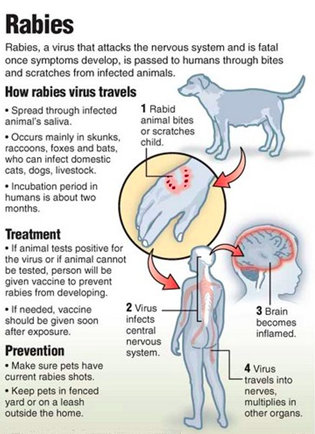
Since rabies was first detected in Sarawak on 30 June last year, 16 people have been infected with the virus. Out of these 16 patients, 15 succumbed to the disease while the 7-year-old sole survivor is still receiving treatment for severe neurological complications. To keep you and your family safe from rabies, here is what you should know about the disease.
1. Once the signs and symptoms of rabies show up, it is almost always fatal.
The signs and symptoms of rabies include fever, headachea, nausea and vomiting, agitation, confusion, hyperactivity, difficulty swallowing, excessive salivation, fear of water, hallucinations, insomnia, and paralysis. As seen in Sarawak, the mortality rate is sky-high at 93.75%. It is important to seek immediate medical treatment if you get bitten by an animal which you suspect might have rabies!
2. Rabies is transmitted via saliva.
The rabies virus is present in the saliva of all infected animals and people. Therefore, it can be transmitted even if the infected animal does not bite you! As long as you have come into contact with rabies-infected saliva, you can be at risk of getting rabies. Take precautions such as wearing gloves and other personal protective equipment when handling animals you think might be rabid. Another option would be to avoid the animal and call your local authorities.

3. All warm-blooded animals can be infected with rabies.
While the majority of rabies cases we see in Sarawak might have been transmitted by dogs, it is important to remember that all warm-blooded animals can be infected. This includes cats! As such, it is ideal to vaccinate your domestic pets against the rabies virus, especially if you are living in a rabies-infected area. As of today (12 December 2018), 56 areas of 11 divisions in Sarawak are rabies-infected areas.
4. Learn to recognise symptoms of rabies in animals.
Rabid animals usually have unusual behaviour, such as being extremely aggressive or unnaturally friendly. They will also most likely be salivating and drooling.
5. If you get bitten, wash the wound thoroughly and head to the hospital immediately!
If you get bitten by an animal which you suspect might have rabies, wash the wound thoroughly with running water and soap for at least 5 minutes, then repeat with povidone-iodine solution if available. This can help to wash away the virus. After that, seek immediate medical evaluation at your nearest healthcare facility.








